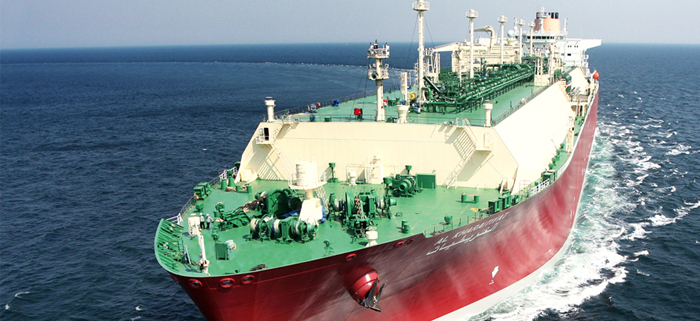South Korea's shipbuilders led by Hyundai Heavy Industries Co. are scampering to develop eco-friendly power systems for ships to comply with stricter emission regulations.
The International Maritime Organization (IMO) has required carriers to operate vessels designed to cut emissions by over 30 percent by 2025 compared with 2008.
The requirement for emission levels reduction may reach 40 percent in 2030 and by 70 percent in 2050.
Beginning this year, the IMO lowered the maximum sulfur content on fuel from 3.5 percent to 0.5 percent.
Consequently, HHI and its holding company Korea Shipbuilding & Offshore Engineering Co. set up a center in March to develop ships powered by both fuel cells and liquefied natural gas (LNG) engines by late 2021.
In March 2019, Hyundai Heavy got the green light for the design of a crude carrier with the LNG-fuel cell-propelled engine system from DNV-GL, Norwegian-German quality assurance, and risk management firm.
The approval by DNV-GL enables Hyundai Heavy to receive an order for the ship with the system from buyers.
Hyundai Heavy also signed a deal with local fuel cell maker Mico Ltd. to develop a fuel cell system for ships in November 2019.
Hyundai Heavy's rival Samsung Heavy Industries Co. and Daewoo Shipbuilding & Marine Engineering Co. are also pushing for eco-friendly ships.
Samsung Heavy has signed a deal with U.S. fuel cell maker Bloom Energy to secure core technologies of solid oxide fuel cells (SOFCs) for LNG carriers and shuttle tankers by 2022.
DNV-GL also approved the company's design for fuel cell-propelled crude carriers in September 2019.
Meanwhile, Daewoo Shipbuilding has started developing lithium-ion energy storage systems for ships.



 Once Upon a Farm Raises Nearly $198 Million in IPO, Valued at Over $724 Million
Once Upon a Farm Raises Nearly $198 Million in IPO, Valued at Over $724 Million  SpaceX Pushes for Early Stock Index Inclusion Ahead of Potential Record-Breaking IPO
SpaceX Pushes for Early Stock Index Inclusion Ahead of Potential Record-Breaking IPO  Amazon Stock Rebounds After Earnings as $200B Capex Plan Sparks AI Spending Debate
Amazon Stock Rebounds After Earnings as $200B Capex Plan Sparks AI Spending Debate  Sony Q3 Profit Jumps on Gaming and Image Sensors, Full-Year Outlook Raised
Sony Q3 Profit Jumps on Gaming and Image Sensors, Full-Year Outlook Raised  Instagram Outage Disrupts Thousands of U.S. Users
Instagram Outage Disrupts Thousands of U.S. Users  SpaceX Prioritizes Moon Mission Before Mars as Starship Development Accelerates
SpaceX Prioritizes Moon Mission Before Mars as Starship Development Accelerates  Nvidia, ByteDance, and the U.S.-China AI Chip Standoff Over H200 Exports
Nvidia, ByteDance, and the U.S.-China AI Chip Standoff Over H200 Exports  Hims & Hers Halts Compounded Semaglutide Pill After FDA Warning
Hims & Hers Halts Compounded Semaglutide Pill After FDA Warning  American Airlines CEO to Meet Pilots Union Amid Storm Response and Financial Concerns
American Airlines CEO to Meet Pilots Union Amid Storm Response and Financial Concerns  Trump Backs Nexstar–Tegna Merger Amid Shifting U.S. Media Landscape
Trump Backs Nexstar–Tegna Merger Amid Shifting U.S. Media Landscape  TrumpRx Website Launches to Offer Discounted Prescription Drugs for Cash-Paying Americans
TrumpRx Website Launches to Offer Discounted Prescription Drugs for Cash-Paying Americans  OpenAI Expands Enterprise AI Strategy With Major Hiring Push Ahead of New Business Offering
OpenAI Expands Enterprise AI Strategy With Major Hiring Push Ahead of New Business Offering  Ford and Geely Explore Strategic Manufacturing Partnership in Europe
Ford and Geely Explore Strategic Manufacturing Partnership in Europe  Uber Ordered to Pay $8.5 Million in Bellwether Sexual Assault Lawsuit
Uber Ordered to Pay $8.5 Million in Bellwether Sexual Assault Lawsuit  Global PC Makers Eye Chinese Memory Chip Suppliers Amid Ongoing Supply Crunch
Global PC Makers Eye Chinese Memory Chip Suppliers Amid Ongoing Supply Crunch  Nvidia CEO Jensen Huang Says AI Investment Boom Is Just Beginning as NVDA Shares Surge
Nvidia CEO Jensen Huang Says AI Investment Boom Is Just Beginning as NVDA Shares Surge 































